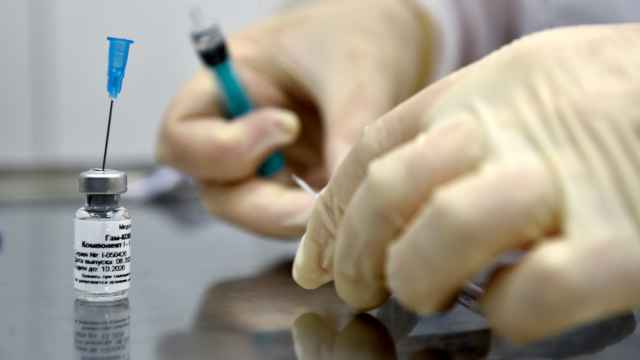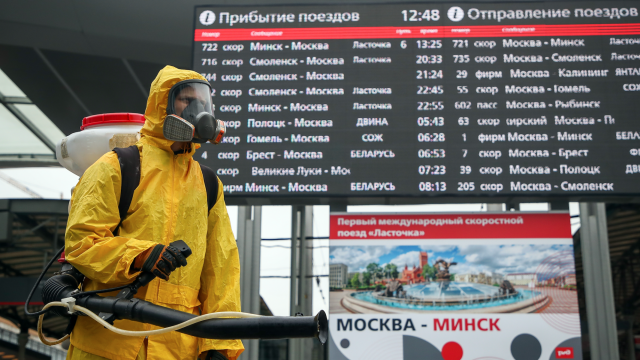Russia claimed its Sputnik V coronavirus vaccine provides “robust” long-term protection against the Omicron variant Friday, contradicting the findings of an independent study which found the Russian jab produced no antibody response whatsoever to the new, highly transmissible variant.
Russia’s study, conducted by the state-run Gamaleya Institute which developed Sputnik V, said it had found “Sputnik V demonstrates high virus-neutralizing activity against the Omicron variant and is expected to provide strong defense against severe disease and hospitalization.”
The laboratory study looked at the levels of virus-neutralizing antibodies — a key element of protection against being infected with the virus — generated in blood samples of vaccinated individuals when presented with the Omicron variant.
The study found the antibody response generated by Sputnik V against Omicron was significantly lower — up to 12 times — than the levels produced against the original coronavirus variant. But it added this was three to seven times better than the dropoff in protection recorded by the Moderna and Pfizer vaccines in other studies.
“Sputnik V is expected to provide long-lasting protection against severe disease by Omicron,” the Gamaleya institute said in a statement.
The laboratory experiment was conducted using blood samples from people vaccinated with Sputnik V more than six months prior, the developers’ said. It added that 100% of people who received a Sputnik booster shot in addition to the first two shots of Sputnik V “developed neutralizing antibodies against Omicron.”
But questions were immediately raised about the findings, which were published as a press release, as they appeared to contradict independent research showing Sputnik V produced no neutralizing antibody response against Omicron.
In a study published earlier this week, and reported by Bloomberg on Friday, researchers at the University of Washington and Swiss pharmaceutical firm Humabs Biomed found “individuals vaccinated with … Sputnik V … had no neutralizing activity against Omicron.”
That study used a similar methodology, testing how blood samples from 11 healthcare workers in Argentina who had received Sputnik V responded to the Omicron variant.
It also tested responses among blood samples from individuals vaccinated with other vaccines, finding “significant and unprecedented” reduction in virus-neutralizing activity across the board.
But no other vaccine recorded the same complete disappearance in protection as Sputnik V. The most stable protection appeared to come from those who had both been vaccinated with an mRNA vaccine and had a previous Covid-19 infection.
That study is a preprint publication, meaning it is yet to be peer-reviewed. Russia’s study has also not been peer-reviewed — only select results were published as a press release on the vaccine’s website.
The Russian Direct Investment Fund (RDIF), which financed the development of Sputnik V, rejected the study's findings. In a statement to The Moscow Times it said: "The study raises false allegations in relation to the efficacy of the Sputnik V vaccine against Omicron variant deliberately using serum samples that are not representative."
Russia’s Sputnik V jab is yet to be approved by the World Health Organization (WHO) due to a lack of data provided by Russia and a failed inspection at one of the vaccine production sites.
Sputnik V is an adenovirus-based vaccine — the same type used in the AstraZeneca shot — made of two different components. This differs from the mRNA vaccines produced by Pfizer/BioNTech and Moderna.
Sputnik V’s developers have previously been accused of cherry-picking data to promote the vaccine internationally, and of aggressively criticizing the mRNA vaccines — particularly Pfizer — as weaker and offering short-term protection.
Update: This story was updated after publication to include a response from RDIF.
A Message from The Moscow Times:
Dear readers,
We are facing unprecedented challenges. Russia's Prosecutor General's Office has designated The Moscow Times as an "undesirable" organization, criminalizing our work and putting our staff at risk of prosecution. This follows our earlier unjust labeling as a "foreign agent."
These actions are direct attempts to silence independent journalism in Russia. The authorities claim our work "discredits the decisions of the Russian leadership." We see things differently: we strive to provide accurate, unbiased reporting on Russia.
We, the journalists of The Moscow Times, refuse to be silenced. But to continue our work, we need your help.
Your support, no matter how small, makes a world of difference. If you can, please support us monthly starting from just $2. It's quick to set up, and every contribution makes a significant impact.
By supporting The Moscow Times, you're defending open, independent journalism in the face of repression. Thank you for standing with us.
Remind me later.






